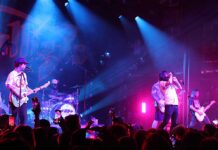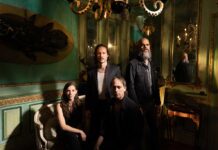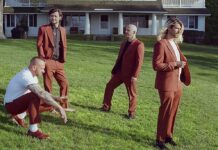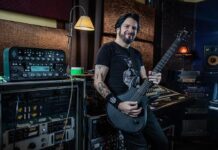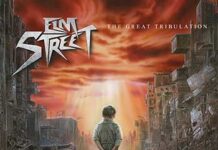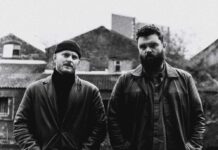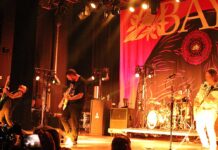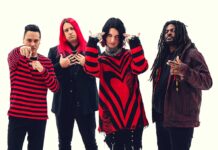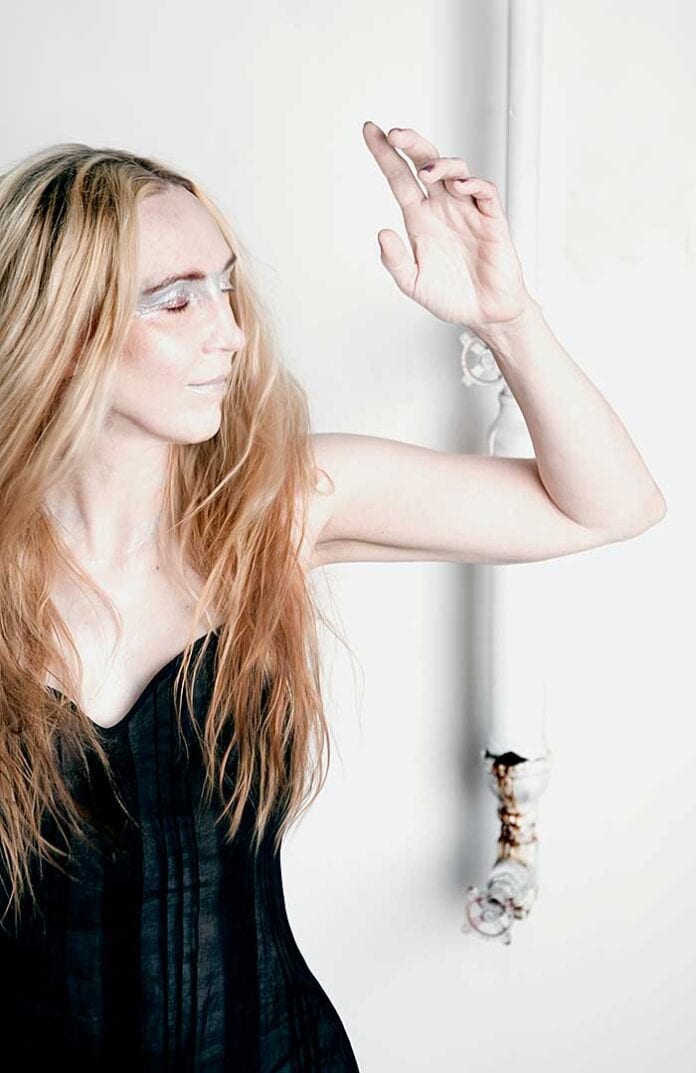
INTERVIEW BY KEVIN STEWART-PANKO
PHOTOGRAPHS BY MARILYN CHEN & MOSELLE
Jarboe La Salle Devereaux has been a unique and constant figure in underground music since the mid 80s when she uprooted from theater/literature student at Georgia Tech in Atlanta to the experimental grit of pre-Disney New York City’s Lower East Side and its then burgeoning and unpredictable music and art scene. Being a member of Swans from 1984–97 was a launching pad to a prolific career that has not only bequeathed the world over 100 solo, band, and collaboration records, but an impressive spate of performances at traditional festivals and on tours, as well as in countless non-traditional locales and locations. This says nothing of her collection of work in visual art fields and being recognized and immortalized as a cultural icon by a variety of referencing authors, critics, and music industry high foreheads.
The latest addition to her ever-growing body of work is her solo album, Illusory. Released on Belgium’s Consouling Sounds label, it’s a work that’s as harrowing and confrontational as it is serene and atmospheric. Songs, sections, and sequences that may seem like minimalist aeration or meandering noisemaking are in fact heartfelt parries taken at the state of the world through the calming lens of her ongoing practice of the tenets of Tibetan Buddhism.
At the time we sat down to write this, Jarboe was supposed to be ankle deep in a month long European tour in support of Illusory, but with everything being cancelled for the foreseeable future, Outburn—and yes, she still cherishes her ongoing relationship with the magazine/website, including a recollection of 1998, the year her birthday was the focus of a feature and she penned a guest editorial—rang her up to discuss fervid independence, rebellion by being incorrect, and the lasting impact of life in Swans.
So, what are you supposed to be doing right now?
Well, I canceled the tour we were supposed to be doing before it would have been canceled anyway. That tour had a lot of interesting opportunities—live radio stuff, an in-store, playing art venues in Copenhagen and London—that I was looking forward to. So, we were totally stoked, totally excited and rehearsing, and then, before all the lockdowns around the country and countries started, I was thinking that this wasn’t going to be possible and wasn’t going to happen. So, I made the call to our booking agent before everything got locked down to just go ahead and cancel. We had just successfully received our visas for Russia and we were actually going to be over there longer because we had the luxury of having an entire day to go through this PA system in Moscow, and it really kind of screwed us and we had to rethink everything. It’s something that can really depress you and bring you down as an artist, and that’s just me. Think about all the other people out there who are out of work, too. It’s heavy shit and a historic moment for all of us, and I feel the uncertainty right now even though the agency went ahead and booked the tour again from approximately mid November to mid December, but it’s like, “Okay, let’s hope for that.” I mean, Nick Cave has tour dates scheduled for the fall and the Masquerade club here in Atlanta has shows booked in June on their schedule, but I’m just not seeing how it’s going to get better until there’s a vaccine and it’s a global treatment. On this tour, I was also supposed to get copies of my new album because the company is in Belgium and now I’m not going to be physically over there to pick up copies to sell on the road. How do I get copies in the States? I don’t know how things are shipping out of there right now.
“I’M JUST NOT SEEING HOW IT’S GOING TO GET BETTER UNTIL THERE’S A VACCINE AND IT’S A GLOBAL TREATMENT.”
Yeah, it certainly is a weird time. The thrust of this conversation is supposed to be your new album, but the temptation is to ask you about everything, especially considering your extensive background and the crazy number of albums you’ve played on. It was like, “Okay, maybe I need to limit this to topics that interest me personally?”
The thing is that I’ve done so many albums and been on so many releases, but I’ve been completely independent, doing every single thing myself and started going directly to digital. I use a service called DistroKid and I’ve been doing that for many, many, many albums. So, that kind of bypasses the so-called music business of keeping track of CDs and records and that kind of thing. I was deliberately avoiding that route for years. I got the rights to all my albums back from the record labels, waited until the time I could regain control, then went digital. But then I learned through trial and error when going on the road—I like to tour Europe—that it’s a good idea to have a European label to the manufacture the items to sell at the shows and that’s how I got involved with these labels in Europe. And I think that’s a good idea because then you can fly over there, pick up your merch and whatever and that’s also a good way to generate revenue to help the tour. I also learned about hiring a publicist to do more than you can do by yourself or by Facebook to generate interest in your shows and tours and that kind of thing. Still, I’m very picky about all that, especially about who’s going to do it, how many copies are made, and so on. It’s all still very carefully controlled and, of course, you always retain your publishing and self-publish. That’s what I’ve learned from being in music.
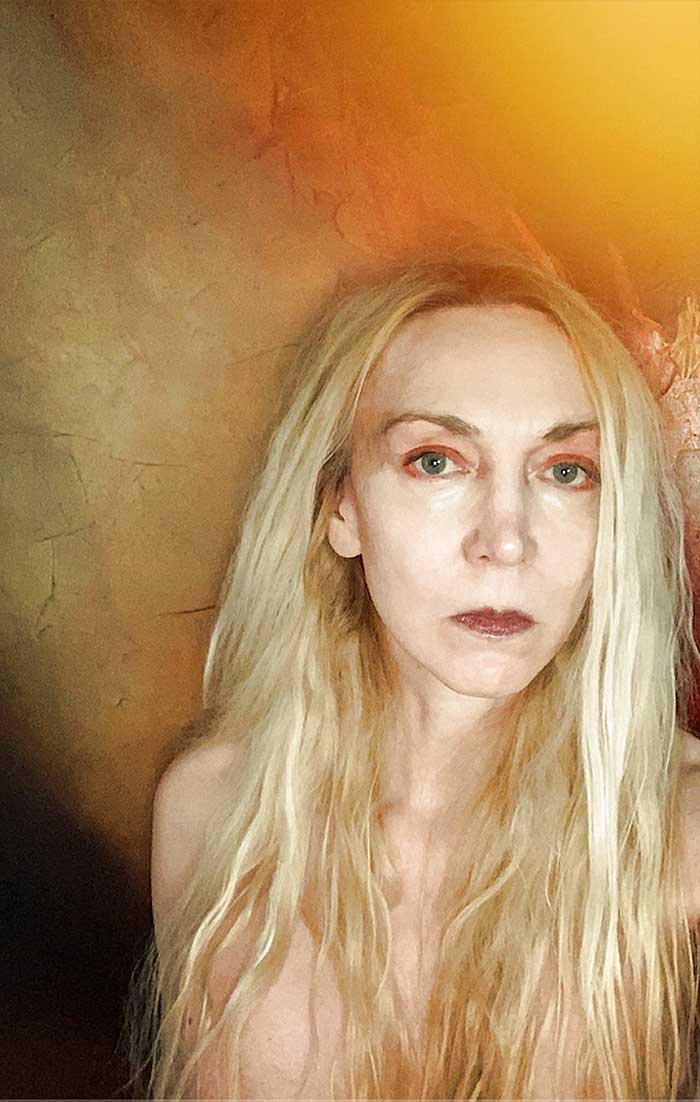
With both your parents being FBI agents and coming from that straight-laced world, was getting into music your source of rebellion when you were growing up?
Actually, my dad was an extremely talented singer and could play guitar, and we had a huge Hammond organ in the house and he could play that. He was very, very musical and was also an amazing artist—he could draw or paint anything. He spent a lot of time doing music and art—those were his hobbies. He’s responsible, I believe, for the interest I had in music and art as a little kid. Even before I was school age, he was always encouraging music and getting me to sing. There was the day when he sat me at the keyboard and would say, “Sing this note,” and he would play different notes. We were always singing together, and I got really good at playing from the music books and songbooks of the songs he liked. I became very precocious in that way and I knew a lot of that classic material as a kid. Most young children of my generation didn’t know all these old songs that were popular when my father was young, and when I went into school he encouraged me to join the choir and all that. When I got older, he hired a keyboard and vocal coach for me. Every Saturday I was going to these lessons, and it was really hard and very taxing because it was just like being at another day of school. So, the only real rebellion period I went through was when the keyboard teacher was reprimanding me for displaying too much “freedom of expression” in how I played. And the vocal coach was the same way. She was like, “You’re singing technically incorrect.” They were teaching me Gilbert and Sullivan, which is like light opera, and I learned how to do that, but I really just wanted to do what the vocal coach would say was pop and rock and not real singing. “Incorrect singing,” she would describe it as. That was drilled into me and the sense of rigidity and playing exactly as the manuscript says was the thing I rebelled against. They taught me that, and the teachers were very, very firm, brutal actually. When I was in choir, me and this other girl discovered we could hit this particular high note and that moved us along and moved me away from a certain type of singing and towards what I wanted to do, which was the expressive rock kind of stuff. That was the rebellion and that was what my father didn’t like. Also at that time, I changed my appearance and started to look like I was ready to hit the stage with a rock group. He didn’t like that and was very upset with how I was turning out. I would say that was when the rebellion changed—when I learned there were different styles and aesthetics of music and how to sing, and there’s a very huge debate in there depending on what world of music you’re talking to. I realized I was going to be in the self-expression, anti-establishment type of singing and playing, and that is when the big divide came between my father and I, and it got really mean and hardcore. That’s what propelled me to leave the house and get out. I had to be me.
“I REALIZED I WAS GOING TO BE IN THE SELF-EXPRESSION, ANTI-ESTABLISHMENT TYPE OF SINGING AND PLAYING”
It’s well known that you became obsessed with Swans after hearing 1983’s Filth album. When you first heard the band, was what they were doing similar to your own endeavors, or was the Swans sound already bouncing around in your head?
Around that same time, I discovered and was attracted to all these groups that were doing something different, like Einstürzende Neubauten, Throbbing Gristle, Cabaret Voltaire, and SPK. There was a huge list of artists that were doing something different in the world that was part of the neo-industrial/industrial movement and culture with RE/Search magazine. The radio show I was listening to on WREK, the Georgia Tech station, was playing this stuff, and that’s when I first heard “Power for Power” from the Filth album. I liked it because it was repetitive, mantra-like and drone-like, and to me it was a very epic sounding recording and it just stayed with me. I remember I stopped what I was doing, turned up the radio, and was just focused on it really intensely. I was unable to find the record anywhere, and that’s what led me to actually go down to the radio station, telling them how much I liked that particular show, meeting the DJ, and then going into the record room where I borrowed—and kept—a copy of that record. I played it so much that I wore it out. There was an address on the back to write to if you wanted to get a copy of the lyric sheet, so I wrote for a lyric sheet and got a letter back from [Swans head honcho] Michael [Gira]. I sent him a letter introducing what I was doing at the time, which was like gallery music using contact mics and screaming, using electronic devices to build up layers of my voice. I was doing a lot of industrial type stuff and underground art gallery stuff.
“I WAS A BOXER, I WAS VERY BUFF AND HAD CALLUSES ON MY FINGERS FROM DOING THAT AND HITTING CONCRETE BLOCKS WITH MY HANDS.”
So, we connected and started talking on the phone, and I asked him if he’d be interested in being interviewed for an art zine I was doing. He said yes, so I flew up there and interviewed him, went to a Swans rehearsal, and was able to meet everybody. I was very forward about all the stuff I could do with my voice, so he became interested in my skill set and I suppose at the time I also looked the part—I was a boxer, I was very buff and had calluses on my fingers from doing that and hitting concrete blocks with my hands. I had a buzz cut, wore Doc Martens, and was teetotal. I gave the appearance of being tough enough to audition and join Swans, but I was the exact opposite of every single person in the band at the time. I didn’t smoke, I didn’t drink, I didn’t do drugs, and I was vegan/vegetarian, so you can imagine what that first tour was like (laughs). I’ll never forget laying in that van with all those guys and all of them chain smoking. I’ll never forget what it felt like—it was hell. And then they were all drinking and that wasn’t something I was used to. But I hung in there from the day I became part of it. I was the only one who endured it and never left because all the other guys came and went, quit and came back, and all that (laughs). In addition to that, you had to put up with being screamed at and yelled at. Michael got very, very ugly in rehearsals and you had to take extreme humiliation in front of all the others and frequently on stage where he’d come right up to you. The ‘97 tour was really famous for that. He would come right up to you and yank the instrument out of your hands and play it, and scream at you right on stage. I’m kind of grateful for all of that, though. I suffered what I guess is a post-traumatic stress disorder, because when I left that situation I was very jumpy, on the defensive and constantly ready to be criticized, and so I think it took its toll. But at the same time, it makes you very tough because you peel all layers of sensitivity when you’re standing—or in my case, kneeling—in front of an audience that is primarily male who are screaming at you to show them your tits and being very abusive. If you can get through that without wincing or even blinking an eye, which is what I did on the early tours—the music was attracting more hardcore audiences—my god, you just went through boot camp and become someone who can perform in any situation.
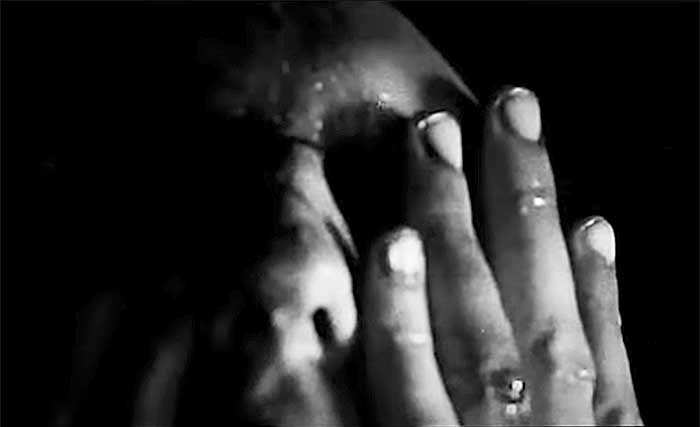
Did those experiences also give you the confidence to break out in different styles and forms and to do the varied collaborations you’ve participated in with Justin Broadrick, Neurosis, Bill Laswell, Cedric Victor, Alison Chesley/Helen Money, and so on?
Well, in the case of Helen Money, we were touring together so we wanted to have something for the merch table. We were familiar with each other and were able to work with one another. I think with Justin, it was the same way. In terms of Neurosis, that was really pure joy because we were both really familiar with each other, and at that point I was very aware of what I learned in Swans, which was to get out of the way of the guitar (laughs). So, when you’re dealing with a metal band with all these guitars, and the guitar steps out, you step back because that’s like the quarterback on a football team and you have to step back and support that. That was a technically easy collaboration because I knew when and how to step out and come back in. The thing is now, I say no more than I say yes. The last one I said yes to was Jozef van Wissem, the well known composer and lute-ist who’s won awards for his soundtrack work on Only Lovers Left Alive, the Jim Jarmusch film. He invited me to work on a song on his new album, and I felt that it was right because I’d heard the music first and felt that I could sing to it. So, I kind of doubled his vocal as a shadow. That was the last collaboration thing I’ve worked on because I really love working alone. I love writing the words, writing the music, recording the vocals, mixing everything, and in some cases mastering everything and having no one in the picture but me. But sometimes, like for the release on Consouling Sounds, there are artists involved that I like to work with. For Illusory, I really aligned with Dehn Sora, who is an amazing musician, artist, and architect who lives in Paris. For the album, I told him the quote I really loved, which I have on my website from Metalitali that said about me, “The true and genuine Pythia of the American underground.” I started exploring what that meant, then I realized that it had to do with hallucinogens and herbs and going into caves and having all these visions that people would then tell the ruler what decisions to make based on these visions and hallucinations. So, Dehn Sora was able to interpret it and put it on the cover of the Illusory album, that Pythia, and that was how the whole album came about—exploring the nature of reality and what Pythia’s visions had to do with deciding reality.
“I REALLY LOVE WORKING ALONE. I LOVE WRITING THE WORDS, WRITING THE MUSIC, RECORDING THE VOCALS, MIXING EVERYTHING…”
Is Illusory completely a solo album or are there guest spots along the way?
I recorded 12 songs, and the label, in order to press it onto vinyl at a certain level of quality, told me to restrict it to 40 minutes, so I gave them seven songs and the other five I’m going to be putting it up digitally myself, but they all work together. The Illusory album uses a technique of words that sound like a language, but they are actually syllables, consonants, and vowels that may not necessarily translate into anything that has any meaning. So, I use that technique all throughout the album, and there are only two songs on Illusory that have English lyrics that are understandable. But yeah, the album is completely mine. Me, totally alone and no one else.
Was it written in one chunk as a whole, or did you take bits and pieces of stuff you had sitting around that you cherry-picked from?
It was all written fresh for Consouling Sound, but the only thing that I pulled from was when I’d gone on tour with Father Murphy in Europe. I had a recorder and I would go to different places and hear interesting sounds, so I started making field recordings and I did incorporate some of those sounds, but that was the whole idea to begin with—that I was going to build up these natural recordings and use them in the songs. So, it was a combination of instruments and the field recordings and a whole lot of voices that are all me, even if it may sound like a bunch of different people.
“’MAN OF HATE’ IS FRESH NOW BECAUSE IT’S ADDRESSING THE PIVOTAL LINE OF WHERE WE ARE. WE’RE THE MEN OF HATE, WE’VE MADE THIS HAPPEN, WE’VE SUPPORTED IT AND ALLOWED IT TO HAPPEN.”
Considering the wealth of recordings you’ve done over the years, was there anything in particular you had in mind with Illusory as far doing something different or having a goal you were trying to achieve or mistakes you were trying to avoid?
I think that’s the path that I’ve been on for many years, going all the way back to [second solo album, 1995’s] Sacrificial Cake. I always have little messages in there that I’ve gleaned from reading and participation in Tibetan Buddhism. So, there’s always a key, and there are people who will understand and appreciate that key. Without a publicist or anything I had a writer reach out who writes for a couple Buddhist publications who got it, and we had a conversation about the Buddhist aspect of the album. So, I think that it’s been a deliberate measure to do that, but I try to keep it so that people with no knowledge or awareness of the topic can get something out of it as well, but the deep underlying message is always going to involve something to do with that. One thing I wanted to say about Illusory is that I redid “Man of Hate,” which is an old song I wrote on [debut solo album, 1991’s] Thirteen Masks. I did a new version for obvious reasons because I was picking up on everything that’s happening, not just in the United States with the current president, but also the right-wing stuff happening around the world. So, “Man of Hate” is fresh now because it’s addressing the pivotal line of where we are. We’re the men of hate, we’ve made this happen, we’ve supported it and allowed it to happen. It’s kind of a reflection on hatred. I did that one deliberately for this album and I did it this time really driving home the theater aspect of it. The language of the lyrics is that of a play. It’s like a narrator addressing a royal court and has an Elizabethan type finality to it. The whole thing comes across like a play where I do the different voices and place the microphones in the different parts of the room that I use so it sounds like a stage or theater, and at the end I use an audience just going ballistic, cheering, applauding for “Man of Hate.” I also use my sick little angelic or cherubic voices that are constantly going against the hatred. At the end, I had the sound of a beheading that’s put in right where the audience is happiest, excited, and cheerful, like “Whack!” and it comes down and chops everybody’s heads off. Hopefully, that drives home the message (laughs).
“TO DO IT YOURSELF IS A WONDERFUL EXPERIENCE WHERE YOU CAN CONSTANTLY BE GROWING AND LEARNING, AND IT’S LIKE BEING AN EXPLORER”
What you’ve just described is an involved process, more so if you’re doing it all alone. Looking back at doing it all yourself over the course of technological shifts and advancements, was it an easy adjustment going from Fostex 4-tracks to digital home recording today, and what are the pros and cons?
Oh yeah, there was an adjustment! It’s been years now, but what I was used to when I was with Swans in New York in The Bunker, which is what we called where we lived because it had no windows and was this street level loft space where we lived and rehearsed. When the rehearsals would end, those guys would all hit the bar, and I would stay in and start recording on the Casio, doing my own music. I was always building up material and recording it, documenting it on these cassettes. Before I joined Swans I wound up being friends with some of the DJs at WREK and was able to use the reel-to-reel and record in the studio, but the way that Swans worked was in studios with big reels of tape and it was completely different. I was frequently given the job to walk to Broadway and buy these reels of tape and they were very expensive, a couple hundred dollars each. So, we had these big, giant reels of tape and we’d record on them and bounce it down and if you made a mistake, you’d have to go back and punch in and we were frequently cutting and splicing the tape. That’s what I got used to. All I really had to do was perform and the engineer was in there dealing with all the equipment and tape. Going into an expensive studio and recording was what I had and knew all those years. When I wasn’t in Swans, I had to learn how to do this stuff myself and when I started out I was still going to studios, little studios and home studios where other people would be in charge, and then I just forced myself to start learning how to do it. The more you do it, the more you end up keeping up with changes in the technology and the more you learn what not to do. The one thing that I learned through Michael was the idea of embracing what you may have thought of as a mistake and those happy accidents and accentuating them. That was part of the process and rethinking. I don’t like perfect gloss. I want to hear some earth, some rawness, some humanity, and I’m not really into everything being technically flawless. And also, with vocals, I did spend a lot of time editing, and it’s very hard to spend a lot of time editing out mouth sounds and unexpected breaths, but sometimes I found that I actually like that and I’ll leave it in. But for years, I was working with other people and going into studios in New York, so to make the transition to doing it yourself is very freeing and now everybody is doing it that way. To do it yourself is a wonderful experience where you can constantly be growing and learning, and it’s like being an explorer is the way I’d describe it.
All things considered, what haven’t you done that you’d like to do?
Do you mean in terms of art, music, and performance?
“THE BIGGEST THING FOR ME IS TO KEEP TRYING TO OVERCOME THE PITFALLS OF THE HUMAN MIND AND THE PITFALLS OF DEALING WITH REACTIONS”
Sure, but not necessarily. Whatever is out there that you’d still like to do?
Hmm…I think the ultimate answer to that question goes back to Buddhism. I recognize when I’ve failed in terms of a response to something or a reaction to something and I question why I allowed something to happen that I know is a waste of energy. So, I think the biggest thing for me is to keep trying to overcome the pitfalls of the human mind and the pitfalls of dealing with reactions to something and trying to have a bigger picture. And that’s sort of the journey that stays with you until the end (laughs). But, as a little child I was always dreaming of being able to travel, so I’m very happy that I’ve been able to do that through music and have as many experiences as I’ve had, and that’s the joy for me, it’s an adventure. Ever since I was little, I’ve always been drawn to Europe and foreign countries and I seem to feel more comfortable when I’m in a place that’s unfamiliar. People sometimes criticize me for enjoying going to other countries, but you have to go where your heart is. It’s not that I don’t love my own country. It’s that it’s a very different experience. This country is not generous in terms of how they treat artists. I’ve found that in Europe, the entire experience is more welcoming, from the promoters to what they provide for food to fulfilling the backline requirements.
I imagine that it’s easier to have that same wanderlust because connectivity to home is simple, affordable, and instantaneous?
Yeah, but that’s also a choice. You don’t have to be connected to anyone at all (laughs). It is funny how you can go on tour and people will be like, “Oh, I just saw you on YouTube,” because some kid filmed the show from the night before and put it up. Do we really have any privacy and can we turn anything off? Probably not.
As far as the business side goes, is it difficult keeping track of everything? Have you ever got a publishing check come in for something that you don’t even remember doing?
Well, it’s important for people to register everything with ASCSAP or BMI for publishing, and there are services and agencies that become your administrators. You sign a contract with them, and they will track down the money for you. So, there are people out there working for independent artists so that you don’t have to go through business managers, managers, and so on. You can just sign up with one of these services, and it’s actually really easy now for artists to do it yourself. With DistroKid, they give you meticulous accounting of where your music is streaming and where it’s been downloaded, and that’s been really enlightening to see where the revenue streams are. It’s pretty seamless.
“I ALSO LIKE TO STEP AWAY FROM THE MUSIC AND NOT HEAR ANYTHING AND HAVE COMPLETE SILENCE.”
With everything you’re involved in, do you ever have issues with organization and keeping up with everything that needs to be done? Do you have the mother of all whiteboards in your home that’s just covered like a giant to-do list?
I keep things categorized with very extensive notes and I also like to step away from the music and not hear anything and have complete silence. When I go back, you obviously hear it differently. I think it’s important to not get burned out and to keep cleansing the palate as it were. So, if I’m writing or conceptualizing on something, I try not to listen to anybody or anything. I don’t want any of that in my head, so I have to be very careful even to have incidental music playing in the background somewhere. I’m either deliberately working or have total silence. The only time I listen to music other than my own music when I’m working on it, is when I’m in a vehicle and I have to go somewhere or do something, then I’ll listen to whatever I’m interested in hearing via streaming on Apple Music. That’s my primary way of listening to music now, streaming. I’ve moved several times in my life and I’ve moved all these albums with me. I’ve got to the point now where when the last time I moved, I got rid of I don’t even know how many books, CDs, and albums (laughs).

